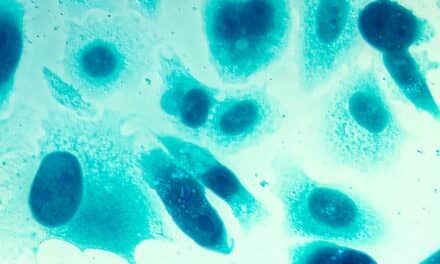Chronix Biomedical, San Jose, Calif, has filed a provisional patent application for the precise measurement of cell-free DNA (cfDNA) in plasma, using digital PCR technology as a way to monitor the medical status of patients with transplanted organs or cancer through a liquid biopsy.

Chronix Biomedical principals (from left) Howard Urnovitz, PhD, CEO, CSO, and cofounder; Julia Beck, PhD; and Ekkehard Schuetz, MD, PhD; with medical advisor Michael Oellerich, MD.
Digital PCR is a new approach to cfDNA detection and quantification that directly counts the number of target cfDNA molecules rather than comparing results to reference standards. The challenges associated with this approach relate to the difficulty involved in standardizing cfDNA measurements resulting from low concentrations and the variable fragment sizes of cfDNA.
In a recent presentation titled “Diagnostic Use of Digital PCR for Liquid Biopsy,” Ekkehard Schuetz, MD, PhD, FACB, chief technology officer of Chronix Biomedical, showed results from the company’s new proprietary methodology that improves digital PCR quantification of cfDNA. The presentation was delivered to the Digital PCR Conference held in La Jolla at the beginning of October.
Chronix liquid biopsy tests provide the earliest detection system for organ rejection in patients receiving an organ transplant and, in cancer patients, provides for the earliest determination of treatment effectiveness while monitoring for recurrence.
“Liquid biopsy is an upcoming medical diagnostics tool that detects pathologic events, such as cancer progress, organ transplantation rejection, and graft injury, through blood testing,” says Schuetz. “Digital PCR is particularly suited to fulfill the needs of precision and reliability, enabling unprecedented diagnostic sensitivity and specificity. This allows more detailed monitoring of patients at reasonable costs, which lowers the burden of disease, with health-economic implications resulting from earlier intervention options.”
“Our experience with over 36,000 unique digital PCR reactions to date has allowed us to design standardization protocols to be able to consistently quantify trace amounts of cfDNA in the blood of patients with cancer or organ transplants,” says Chronix Biomedical senior scientist and study coauthor Julia Beck, PhD.
Michael Oellerich, MD, FACB, FRCPath, distinguished professor of clinical chemistry at the University Medical Center Göttingen and a medical advisor for Chronix Biomedical, observes that “the precise quantification of cfDNA for monitoring disease processes is a fascinating and new high-precision approach for a real-time view of graft health, and a tool for molecular monitoring of response and relapse in oncology.”
Chronix Biomedical is a privately held molecular diagnostics company with headquarters in San Jose, Calif, and laboratories in Brookings, SD, and Göttingen, Germany. The company has a growing patent portfolio focused on liquid biopsies and related technologies. The company currently offers its cancer tests in Europe, the UK, and the Middle East, and is collaborating with cancer groups worldwide to provide critical data for their research studies. For additional information, visit Chronix Biomedical.




